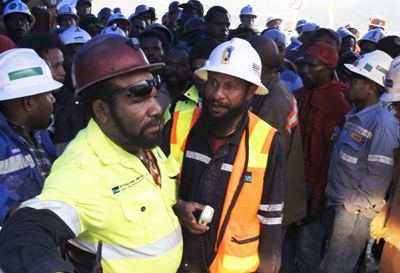
killing 28.

Vol. 77/No. 22 June 10, 2013
(lead article) |
| Reuters |
| Workers from Freeport-McMoRan Grasberg copper and gold mine in Papua, Indonesia, block road leading to mine May 15 after bosses’ disregard for safety led to tunnel collapse killing 28. |
Hundreds of miners blocked the road leading to the mine after the collapse, demanding safer working conditions. Freeport workers from seven Papuan tribes set up a tent outside the tunnel.
“We do not accept the owner and government’s speculation that the incident was a ‘natural disaster,”’ union spokesperson Virgo Solossa said in a May 27 interview. “We think the collapse resulted from poor safety standards.”
The tunnel was part of the Big Gossan underground facility, where the 38 miners were training. The rescue operation being carried out by local police and the Indonesian military has been slow, hampered in part by the tight space. PT Freeport Indonesia, the local subsidiary that operates the mine, has suspended some operations.
“The mine owner and government say areas not affected by the collapse can resume,” Solossa said. “We are very angry because we think production will hamper the investigation and we — the workers at the mine and the family of the lost miners — need an explanation.”
The Grasberg mine, which employs 24,000 workers, is the second-largest copper mine in the world and has the world’s largest reserves of gold. Eleven workers have been killed in landslides at the open-cut mine since 2003.
The Indonesian government has a 9 percent stake in Freeport Indonesia, which expects a major increase in sales this year. Mining accounts for 12 percent of the economy in Indonesia, but little of the wealth created by workers at the Grasberg mine stays in Papua.
The mine has been a target of protest in this province, where the Papuan people have a long history of struggle for self-determination against oppressive rule by the Indonesian government.
Eleven people were killed in clashes with the police during a three-month strike at the mine in 2011. The strike by 8,000 union workers crippled production and ended in a victory when management agreed to a 37 percent wage increase over two years.
Workers who joined the strike last year still face harassment and discrimination, Solossa told Reuters April 17, explaining that the company and its contractors are trying to weaken the union. Some 1,130 workers employed by three contracting companies at Freeport ended a three-day strike at the beginning of May this year, after winning an agreement for a pay raise.
Baskaran Appu from Auckland, New Zealand, contributed to this article.
Related articles:
On the Picket Line
In coming class battles, ‘keep eyes on the ranks of labor’
Front page (for this issue) | Home | Text-version home